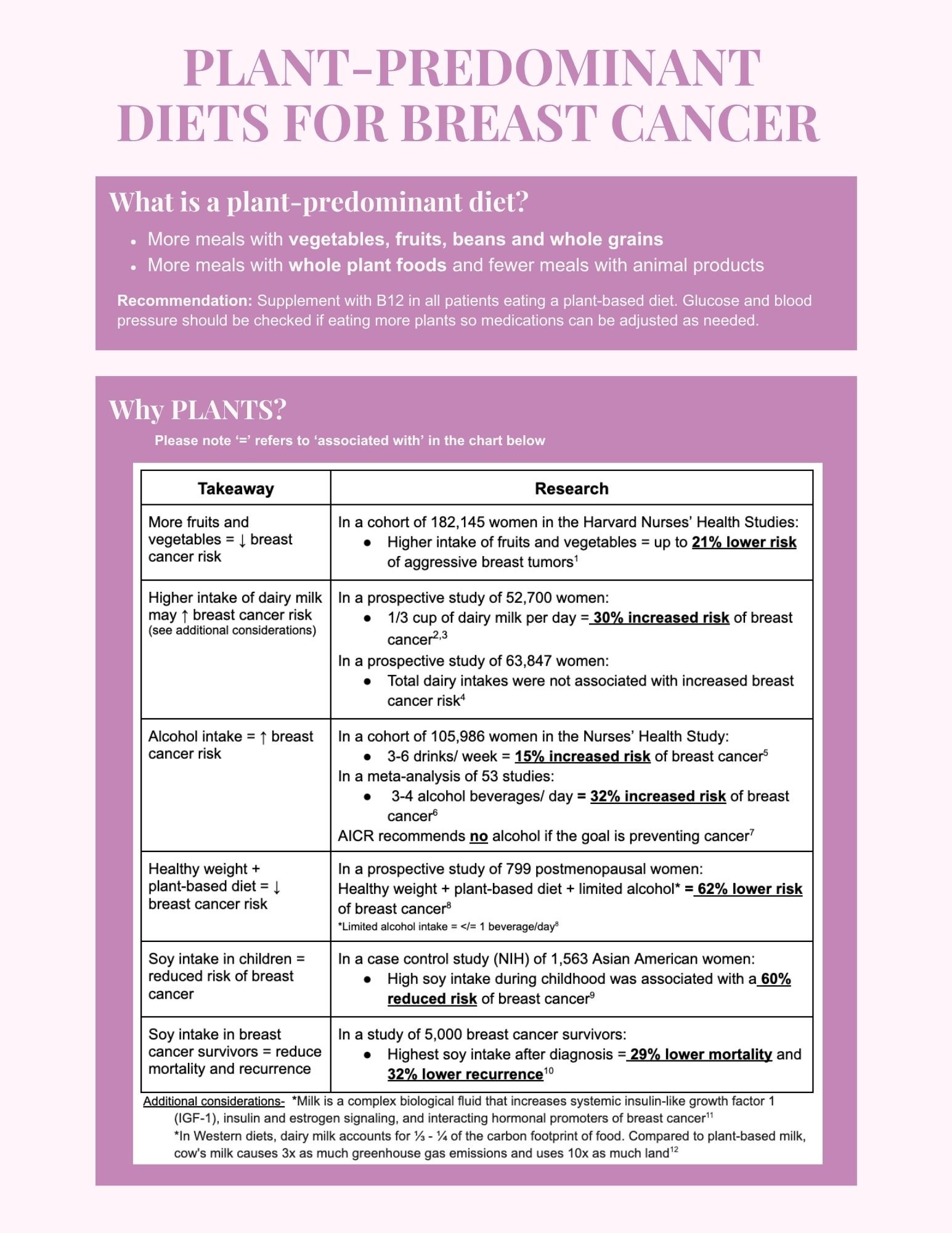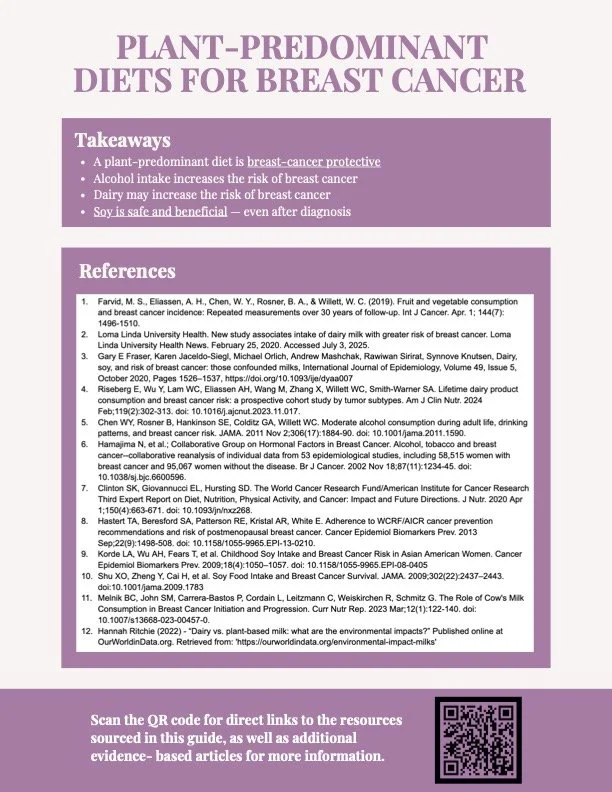breast cancer and nutrition information and references
click on images to print
Farvid, M. S., Eliassen, A. H., Chen, W. Y., Rosner, B. A., & Willett, W. C. (2019). Fruit and vegetable consumption and breast cancer incidence: Repeated measurements over 30 years of follow-up. Int J Cancer. Apr. 1; 144(7): 1496-1510.
Loma Linda University Health. New study associates intake of dairy milk with greater risk of breast cancer. Loma Linda University Health News. February 25, 2020. Accessed July 3, 2025.
Gary E Fraser, Karen Jaceldo-Siegl, Michael Orlich, Andrew Mashchak, Rawiwan Sirirat, Synnove Knutsen. Dairy, soy, and risk of breast cancer: those confounded milks. International Journal of Epidemiology, Volume 49, Issue 5, October 2020, Pages 1526–1537, https://doi.org/10.1093/ije/dyaa007
Riseberg E, Wu Y, Lam WC, Eliassen AH, Wang M, Zhang X, Willett WC, Smith-Warner SA. Lifetime dairy product consumption and breast cancer risk: a prospective cohort study by tumor subtypes. Am J Clin Nutr. 2024 Feb;119(2):302-313. doi: 10.1016/j.ajcnut.2023.11.017.
Chen WY, Rosner B, Hankinson SE, Colditz GA, Willett WC. Moderate alcohol consumption during adult life, drinking patterns, and breast cancer risk. JAMA. 2011 Nov 2;306(17):1884-90. doi: 10.1001/jama.2011.1590.
Hamajima N, et al.; Collaborative Group on Hormonal Factors in Breast Cancer. Alcohol, tobacco and breast cancer--collaborative reanalysis of individual data from 53 epidemiological studies, including 58,515 women with breast cancer and 95,067 women without the disease. Br J Cancer. 2002 Nov 18;87(11):1234-45. doi: 10.1038/sj.bjc.6600596.
Clinton SK, Giovannucci EL, Hursting SD. The World Cancer Research Fund/American Institute for Cancer Research Third Expert Report on Diet, Nutrition, Physical Activity, and Cancer: Impact and Future Directions. J Nutr. 2020 Apr 1;150(4):663-671. doi: 10.1093/jn/nxz268.
Hastert TA, Beresford SA, Patterson RE, Kristal AR, White E. Adherence to WCRF/AICR cancer prevention recommendations and risk of postmenopausal breast cancer. Cancer Epidemiol Biomarkers Prev. 2013 Sep;22(9):1498-508. doi: 10.1158/1055-9965.EPI-13-0210.
Korde LA, Wu AH, Fears T, et al. Childhood Soy Intake and Breast Cancer Risk in Asian American Women. Cancer Epidemiol Biomarkers Prev. 2009;18(4):1050–1057. doi: 10.1158/1055-9965.EPI-08-0405
Shu XO, Zheng Y, Cai H, et al. Soy Food Intake and Breast Cancer Survival. JAMA. 2009;302(22):2437–2443. doi:10.1001/jama.2009.1783
Melnik BC, John SM, Carrera-Bastos P, Cordain L, Leitzmann C, Weiskirchen R, Schmitz G. The Role of Cow's Milk Consumption in Breast Cancer Initiation and Progression. Curr Nutr Rep. 2023 Mar;12(1):122-140. doi: 10.1007/s13668-023-00457-0.
Hannah Ritchie (2022) - “Dairy vs. plant-based milk: what are the environmental impacts?” Published online at OurWorldinData.org. Retrieved from: 'https://ourworldindata.org/environmental-impact-milks'
Dairy - inconsistent risk but high environmental impact
Loma Linda, 52,700 women: 30% increased risk of breast cancer with milk (not cheese, yogurt)
Harvard Nurses Health Study. No association with dairy (milk, cheese, yogurt)
Review of cow's milk- contains IGF1
Dairy -Heavy environmental footprint - GHG, land and water use. Our World in Data
Soy
Shanghai breast cancer survival study 5000 pts - 33% lower mortality and 34% less recurrence with highest soy intake
US Breast Cancer Registry - 21% lower all cause mortality with highest soy intake, esp. with negative tumor hormone receptors
Messina. Good review of soy and Breast Cancer. For soy to reduce breast cancer risk, high intake must occur in adolescence. Post diagnosis, evidence from above studies show that soy can decrease mortality and recurrence
Cancer Organizations
MD Anderson rec. following plant predominant diet. Dairy mixed results
From the American Cancer Society:
.. traditional soy foods such as tofu, tempeh, edamame, miso, and soy milk:
may lower the risk of breast cancer, especially among Asian women
are an excellent sources of protein, especially when they replace other, less healthy foods such as animal fats and red or processed meats
have been linked to lower rates of heart disease
See this summary of Dairy from Dr. Walter Willett - chief of Dept Nutr/Public Health at Harvard for 25 years with numerous publications:




